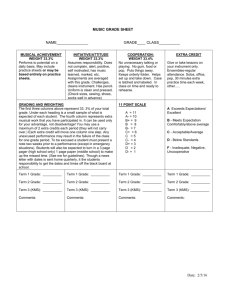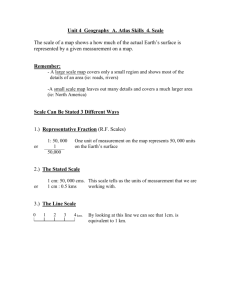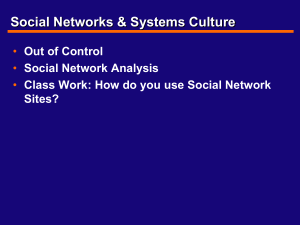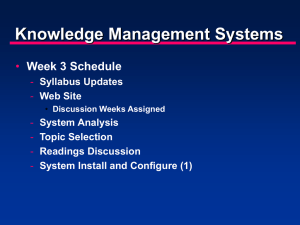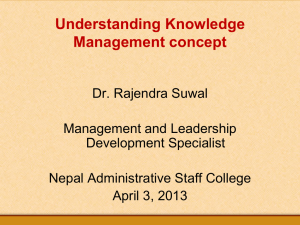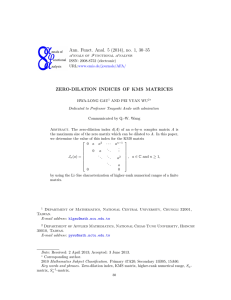The Future of Knowledge Management Systems
advertisement
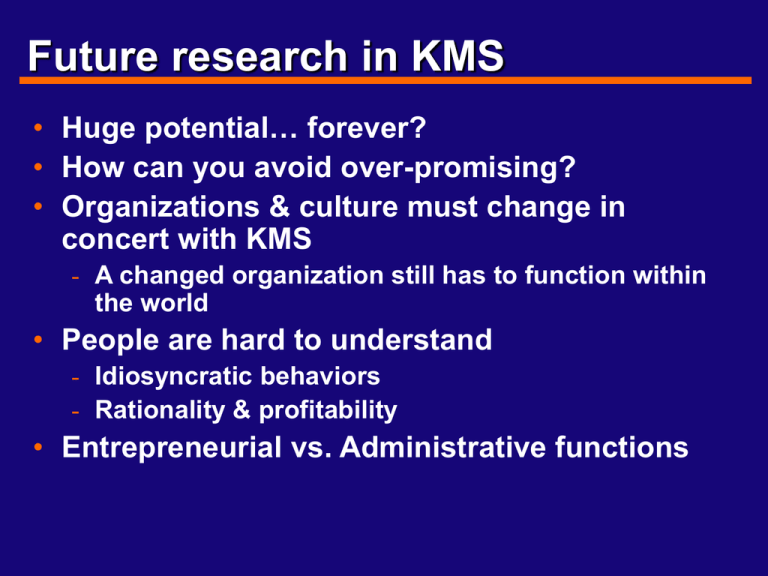
Future research in KMS • Huge potential… forever? • How can you avoid over-promising? • Organizations & culture must change in concert with KMS - A changed organization still has to function within the world • People are hard to understand - Idiosyncratic behaviors - Rationality & profitability • Entrepreneurial vs. Administrative functions What’s the Future of KM? • Davenport, 10 years later - Did Lotus Note & the Web merge? - Agents- no, keywords searches - yes! • KM as Mgmt Enthusiasm • “categorization and organization of knowledge will be a core competence for every firm” - Importance, vocabulary & tools for access • Ensuring that K gets transferred • Enabling conversations (relationships) b/t creators & users Networked K Organization • Everything is or has a network • Organizing knowledge across cultures • Multiple facets of knowledge - Viewing - Representing (ontologies) • Does more digital knowledge = more potential for KM? Information Tech & KMS • Is well-conceived & used IT really KMS? • IT provides a lot of leverage to find, extract & use knowledge - More work or smarter work? - Replacing technologies, not improving work • Information Junkyards - Volume vs. Findability & Actionability • Extending our reach - CMC - email, blogs, social networks - Real time & distributed time Changing what Knowledge means? • • • • • Knowing is a human act Knowledge is the residue of thinking Knowledge is created in the present moment Knowledge belongs to communities Knowledge circulates throgh communities in many ways • New Knowledge is created at the boundaries of old • Leveraging knowledge involves a combination of people & IT • McDermott , p3 How should we use IT? • Speed up the coordination - Forms, agendas, bureaucracy • Extend collaboration - Structures to support each other - Dynamic help for knowledge creation • Work with existing terms & practices - Just make them better, not different - One size does not fit all • Culture changes for groups & individuals Does IT Matter? • Productivity has improved, but not consistently or definitively • Organizations have changed, but not much? • An increase in competitiveness, understanding or innovation? • Doesn’t everyone have this “advantage” now? • Has IT changed organizational strategy? - Tactics have changed, but in simple ways - Cultural expectations have not changed • IT keeps changing into help solving the NEXT problem - You can’t stop using it to see effects - Constant upgrades = time + $$$ Navigating Social Cyberspaces • Understanding Usenet use - Postings • Why • How • Information - Distribution • Cross postings • Specific groups & cultures - Free-riders vs. Contributors - Usenet readers Social Cyberspace Dimensions • Netscan – social accounting metrics - Size of group - Culture - Social cues • Messaging protocols - Asynchronous - Real time (IM) • Discussion Engagement - Frequency, Replies - Date, Time • Thread and Author Tracker - Thread Visualization - New Threads vs. Replying to Old Blogs & Social Dimensions • Are blogs taking the place of newsgroups? • RSS Readers • Topic discovery methods - Blog rolls - Search engines - Links • Issues of Awareness • Posting technologies s. Usenet Answer Garden • • • • • A shared organizational memory system Storing, retrieving and viewing information What methods worked best? What about user paricipation? What’s an optimal size? Agents & Agency • What do we mean by agents? - Science Fiction? - Physical or Virtual? • Are agents just a metaphor? • By defining agents are we defining intelligence? - Replacing people with agents - Replacing systems with agents • Agents force us to discover & address tacit knowledge (experience) in knowledge work Agents are here That’s agents, not robots What kinds of agents are there? • Intelligent Agents - Show “intelligence” in interacting with the environment - Act based on previous facts or rules - Make leaps of intuition - Do things for you • Autonomous Agents - Interact with the environment - Stimulus & response, not always rules - Can perform a wider range of activities over time - Do things we do not or can not do Agents & Angels • Agents as help to manage information • Agents also are creating lots of new data • Possible uses - Managing our social life Replace conventional organizations Helping us find things (web crawlers) Performing repetitive information tasks • A human face on information tasks? - Jeeves, Watson, Sherlock, Eliza, the Wizard - Pushes our interaction into something more “natural” Agents or Angels? • Who manages the agents? • When is a decision made? - Upon arrival of the information - After information is compared - Blink vs. DeepThought • Is it possible to make our information use behavior transparent? - Is it flattering? - What if we find too much information? • Enabling more knowledge work or just more work? - Speed vs. Accuracy Ranks of Agents • Information Brokering - Networks & the Web - Search & Overload Management • Product Brokering - Shopping (Buying?) - Recommendations / Collaborative Filtering • Merchant Brokering - Personalization, Customer “service” - Logical, naïve decisions & gaming • Negotiating - Multi-part decisions - Conversation? How agents should work - Observe interface actions & act - Run “in the background” to - Manipulate information (& the interface) for you • Why this personalized view of agent interactions? - Understanding one person is difficult enough - Group interactions require making relationships explicit Reducing Info Overload = KM? • Most apt use of agents in the last 10 years - Might be creating more information for us to manage - Increases explicit knowledge,but tacit? • We need agents to help do things in real time, without our intervention • The Web & agents are a good match • Understanding behavior & training agents - Watching, examples, (others) profiles - Not filtering as much as ordering • Might be most interesting to see others’ agents, not your own The Big Question(s) • How can KMS help people coordinate, discover & organize information and knowledge? • How can intranets, groupware, weblogs, wikis, instant messaging, search engines, PIMs & email in both individual and organizational contexts help us manage knowledge? • Are certain types of KMS suitable for certain types of tasks, groups or roles?
